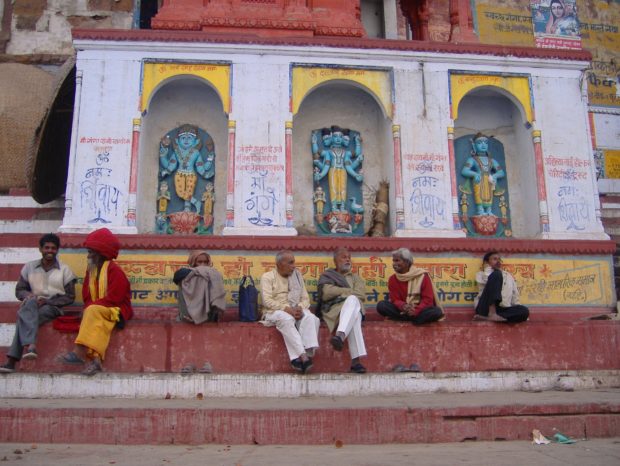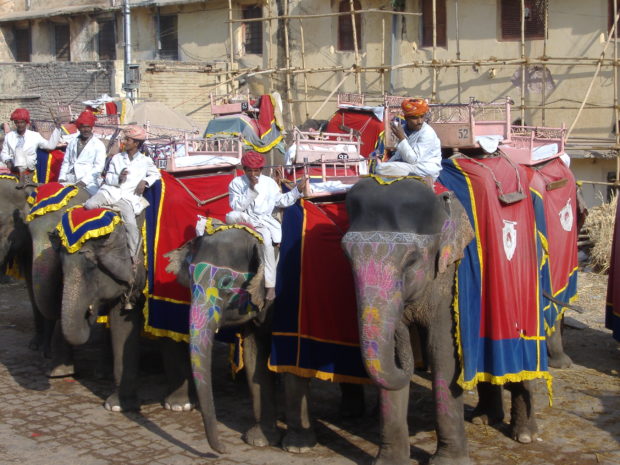You have no items in your cart. Want to get some nice things?
Go shopping
We were on our way to the Sarnath Buddhist temples, where Buddha allegedly stayed. We didn’t think our driver, who was annoyed with us because we wouldn’t eat at the restaurants he suggested, spoke much English until he asked us, “Are you married?”
“I’m not, but she is.” I pointed to my friend Sholeh.
“Were you arranged?” I asked the driver, figuring if he could ask me if I was married, I was entitled to know the details of his marriage.
“Yes, I am.”
“Will you stop talking to the drivers when they are trying to drive,” Sholeh said. “You assume they know more English than they do.”
“Yes, we were arranged,” he said.
“Do you lover her?” I asked, leaning forward.
“Suzanne!” Sholeh said. “Enough!”
“She’s a good wife. She speaks softly to my parents. Very modest,” the driver said, looking into the rearview mirror at me.
That was when we ran over the dog.
We were just pulling up to the temple, and the dog, who had been sleeping on the street, yowled in agony as we rolled over his leg, the cry shrill like ice.
“Oh my God, oh my God,” I said and got out as soon as the car came to a halt. The dog managed to get up and stood on three legs, howling. The dog’s cry summoned a pack of street dogs, eight to be exact, to the scene of the crime. I stood against the car, and the dogs circled me, barking in lamentation for the dog’s useless leg. The injured dog tried to touch the toe of the smashed leg on the pavement, recoiled in pain. The driver got out and tried to shoo the dogs away, but they wouldn’t budge. The dogs stood their ground, circling the car, barking at us. The driver went to charge them, and finally they dispersed. The wounded dog hopped away on three legs.
When we reached the Mulgandkuti Shrine, I was in tears. I love dogs, but it wasn’t exactly the dog that brought the tears – it was the culmination of all of it. I remembered a friend who had mentioned all the sad street dogs in India, and while I am an animal lover, specifically a dog lover, I hadn’t even noticed the dogs before we ran one over. They were just another part of the fabric, along with the lepers and the street children, the blind musicians and the snake charmers, the incense and spices, the melody of the sitar, the monkeys, and the cow struggling down the street with a broken leg, which was a sadder sight than a three-legged dog. There in India, all of it together: the holy and the horrible, the sacred and the ugly. An Indian woman on an airplane would later tell me, “You think India’s got problems, crowds, filth? Come talk to me in 3,000 years when your country is as old as ours.”
“You musn’t cry,” Sholeh said. “Do not let the driver see you crying. Not over a dog. Not because of that.” Sholeh was kind enough not to tell me that it was my fault even though it was; I already knew that had I not been interrogating the driver about his personal life, his eyes would have been on the road.
I nodded. Her request made perfect sense. At home, I would have cried and gone to bed for two days had I been responsible for running over a dog. Here in India, I knew I had to carry on. Inside the temple – dark and cool and private – I let myself cry briefly before pulling myself together. A text came through on Sholeh’s phone. “He won. My son won his basketball game,” she said. “That was my wish at the Ganges. And he won.” I had made a wish for the little street girls selling marigolds, that they would be healthy and happy. Sholeh had known enough to wish for the possible.

After wandering around the Buddhist complex, we told our guide we didn’t want to see any more sights. Though perplexed, he agreed to take us somewhere we could spend the afternoon writing in our journals – seeing the cremation of bodies, the maimed dog, India in general – had given us enough to think about. Our driver brought us to the park-like university, and there, we found green lawns and a temple with a sunny terrace. I chose a marble bench overlooking the grassy campus, sat in half lotus position and began to write. I copied down quotations from the marble walls that I found most interesting: The heart of the worldly man is like the worm in a dung hole. – Ramakrishna
Two monkeys fought in the distance and then scrambled over a roof. A woman selling marigold wreathes looked at her teeth in a compact mirror. The bells echoed, the Hindu chants rang from the temple, water flowed from brass, sprouted over flowers into a metal basin. The gods adorned the walls of the temple, dressed in gold headdresses, occupied rooms within rooms. A family within was blessed with milk.
With the hot sun at my back, the cold marble underneath, I felt something like peace for the first time in days. But not for long. Boys on the terrace circled like kites before the bravest one asked, “What are you writing?” The others huddled around him, their bare brown toes clinging to the hot marble floor.
Two more men, walking hand in hand, stopped, asked, “What do you write? Please tell me.”
Two more school boys huddled round. Two holy men, covered with ash, joined the crowd. I was in the center, pen in one hand, journal in the other. An American woman on the other side of the temple was ready with her video camera. I had become a tourist attraction.
“What is it you write?” they asked. “You must tell us.”
I looked for Sholeh; she was sitting on the other side of the terrace, looking over the university campus, unbothered.
The crowd waited. I could say anything. But I couldn’t tell them I was writing about dead bodies and injured dogs.
“Your beautiful country,” I said and I meant it. They nodded and smiled. I put away my journal, remembered to touch the stone of the temple before I entered, 3,000 years of looking forward, looking back.

About Suzanne Roberts
Suzanne Roberts is the author of the award-winning memoir, Almost Somewhere: Twenty-Eight Days on the John Muir Trail, as well as four collections of poetry. She writes and teaches in South Lake Tahoe, California. More information may be found on her website: www.suzanneroberts.net




